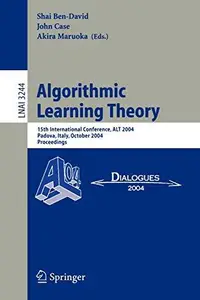- Joined
- Jul 3, 2023
- Messages
- 91,387
- Reaction score
- 1
- Points
- 38

Free Download Algorithmic Learning Theory: 15th International Conference, ALT 2004, Padova, Italy, October 2-5, 2004. Proceedings By Ayumi Shinohara (auth.), Shoham Ben-David, John Case, Akira Maruoka (eds.)
2004 | 514 Pages | ISBN: 3540233563 | PDF | 4 MB
Algorithmic learning theory is mathematics about computer programs which learn from experience. This involves considerable interaction between various mathematical disciplines including theory of computation, statistics, and c- binatorics. There is also considerable interaction with the practical, empirical ?elds of machine and statistical learning in which a principal aim is to predict, from past data about phenomena, useful features of future data from the same phenomena. The papers in this volume cover a broad range of topics of current research in the ?eld of algorithmic learning theory. We have divided the 29 technical, contributed papers in this volume into eight categories (corresponding to eight sessions) re?ecting this broad range. The categories featured are Inductive Inf- ence, Approximate Optimization Algorithms, Online Sequence Prediction, S- tistical Analysis of Unlabeled Data, PAC Learning & Boosting, Statistical - pervisedLearning,LogicBasedLearning,andQuery&ReinforcementLearning. Below we give a brief overview of the ?eld, placing each of these topics in the general context of the ?eld. Formal models of automated learning re?ect various facets of the wide range of activities that can be viewed as learning. A ?rst dichotomy is between viewing learning as an inde?nite process and viewing it as a ?nite activity with a de?ned termination. Inductive Inference models focus on inde?nite learning processes, requiring only eventual success of the learner to converge to a satisfactory conclusion.
Buy Premium From My Links To Get Resumable Support and Max Speed
Rapidgator
rdt4w.7z.html
TakeFile
rdt4w.7z.html
Fileaxa
Loading…
fileaxa.com
rdt4w.7z.html
Links are Interchangeable - Single Extraction



